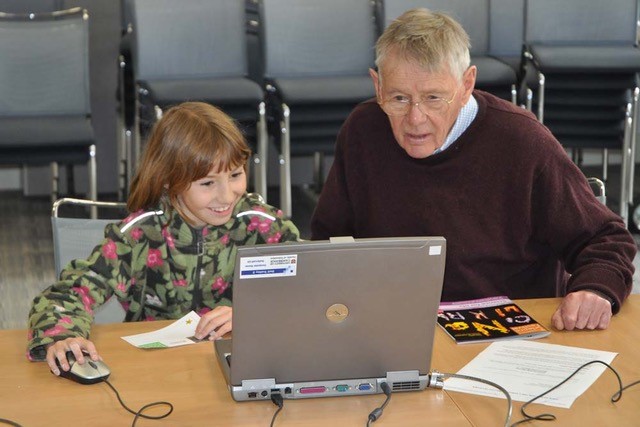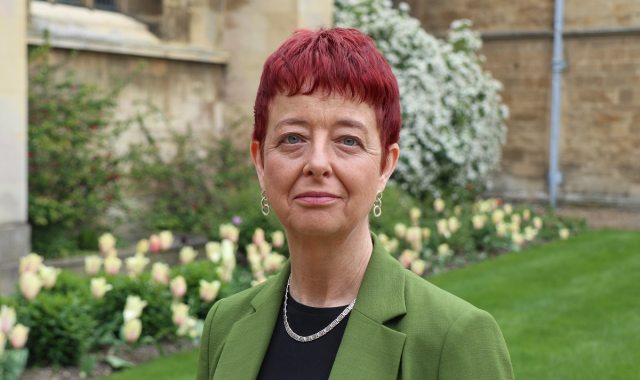How do we learn?
- 07 May 2021
- 6 minutes
Exam season is upon us. We asked Education Fellow Dr Michelle Ellefson about her research on how we learn, the effect of learning through screens during the Covid-19 pandemic, and whether the modified assessments necessitated by the pandemic mean three-hour examinations are a thing of the past.
Dr Ellefson’s PhD is in Brain and Cognitive Sciences, but she switched her focus to Education because of her interest in the skills where there is a “pressure” to learn, like within a school or university. Her full profile is on the University of Cambridge Faculty of Education website and her INSTRUCT lab website provides more detail about her team and their research.
She combines laboratory-based research with classroom learning and curriculum development to better understand mechanisms responsible for cognitive development and to leverage that understanding to improve educational practice. She recently led the Science of Learning event for alumni, which is available on YouTube.
Tell us about your research.
In my INSTRUCT lab, we are interested in the development of children and adolescents, up to young adulthood, and their thinking and reasoning skills. I’m particularly interested in learning science – and we can see the effect from a very young age. For example, infants as young as nine months old are surprised when two objects, say two toy cars, collide, and one subsequently moves faster. What I’m really interested is seeing change across time, to help us understand changes across ages. We can then better understand how those skills match up in terms of learning.
Many of our current research projects focus on the role of executive functions in school achievement. Executive functions are our ability to do challenging stuff that needs us to do something for an extended amount of time or deal with multiple pieces of information. For example, if a person is working on something for a long amount of time, then being able to ignore distractions uses their executive functions.
In a recently accepted paper in the journal Psychological Assessment, we developed a new task for children to measure meta-cognition skills – our ability to reflect on, understand or know how we’re learning. The original definition of meta-cognition skills, by John Flavell in the 1970s, was ‘thinking about thinking’.
A lot of existing research is with adults, usually university students, and there is a growing amount with young children (pre-school, reception, Key Stage 1; under age six). The adult tasks are computerised – is the answer right and how long did it take to make the answer are the key metrics – while the tasks with young children are observational. However, observational work is time intensive and it is not feasible to scale up to a big study.
We developed a task for all ages, called The Zoo Task – you’ve been to the zoo, the bus is about to leave and the zookeeper has asked you to feed the animals before you go. You’re given a map and you must decide the best route to feed the animals. This allows us to do some coding on the map, plus participants can self-assess.
I worked with Event Related Potentials (ERPs) and electroencephalogram (EEG) to analyse brain activity during my undergraduate and masters study, but only a subset of a population was coming into the laboratory, and I wanted to reach the whole population, so I knew I had to be testing in schools. At the time, it was impossible to take EEG/ERP equipment into schools. In the future, I would like to explore technology, perhaps remote eye-tracking and some of the portable EEG/ERP system, but it needs to be used in combination with good tasks.

People from different generations enjoying participating in an experiment (Handout picture from Dr Ellefson)
The pandemic has forced us all to spend more time learning through screens. Is this detrimental, or a positive development?
It’s too early to know for sure, and any position on the extreme is probably wrong. What I will say is that the cognitive system is pretty flexible and able to adjust to different ways information is presented to us.
One of the problems for us with screens is how the information coming at us is quite different to the natural world. Our attention can be drawn to our own video on the screen and how we’re perceived, while there are different cues – sounds, pauses and so on – which change how we interact. It’s related a little bit to executive functions. In video calls, we get distracted by our own videos and have to activate one of the key executive functions, inhibitory control, to ignore our video and focus on the meeting. In addition, we are having to monitor lots of different activities in the videos of others on the screen. This monitoring and inhibitory control is a lot of work for our cognitive system, which is why we are more tired after a day of Zoom calls than our pre-pandemic day of meetings or lectures.
Some university assessments have changed, from the traditional three-hour exam to a 24-hour open book exam. What are your thoughts?
What we know about memory is that memories are much more stable if you’ve got repeated exposure to information over time. That means that cramming for an exam is bad if we need to remember something in the future. However – and I’m going to contradict myself here – there are some real benefits from exams. For example, the very act of trying to remember something increases the likelihood that we will remember it later.
In research about memory, there is a consistent finding that for something to be remembered for a long time we need to have repeated exposure over time and when we can create something with that information it really helps us. I think the Cambridge system of supervisions are really good at that sort of thing, because the timings of supervisions and the assignments related to them foster regular time with the information and an opportunity to produce something. That production could be solving a problem or generating an essay. I usually say to students a lecture is where you’re going to hear about stuff, but where you actually learn is when you prepare for supervisions.
In my own Tripos, students reported when they had the extended exam period last year that they felt they learned a lot more than compared to when they did a three-hour exam. I’m hopeful the last two years give us some confidence there are some changes that we can make that will improve our assessments. Of course, that doesn’t mean that we have to give up on the three-hour exam as it might be the best option in a number of instances, but the flexibility we have adopted should give us a sense where we can make good changes.
Dr Michelle Ellefson (2011), Dr Maria Tsapali (2014), Dr Carly Christensen, Dr Tanya Paes and Claudia Chu spoke in the Science of Learning event.


